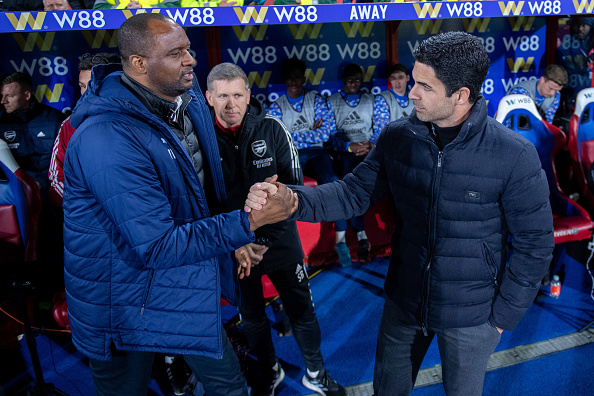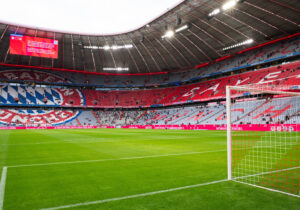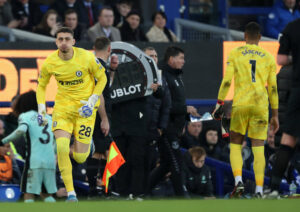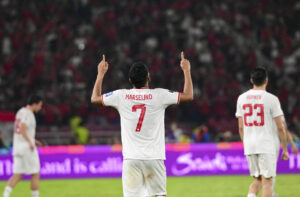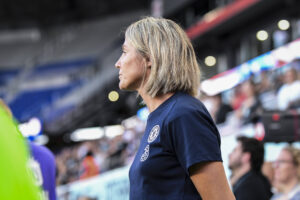Mikel Arteta must feel as if he will forever be in Patrick Vieira’s shadow. Having been one of the numerous players who failed to fill the giant hole that Vieira left in the Arsenal midfield (a hole that remains unfilled nearly 20 years on), Arteta now finds himself suffering unflattering comparisons with Vieira the manager.
After Arteta’s Arsenal suffered a crushing defeat to Vieira’s Crystal Palace, which throws into doubt their chances of qualifying for the Champions League, the Spaniard finds himself being asked why, in two and a half years at The Emirates, he has not effected the Palace revolution that Vieira has overseen in less than nine months.
Patrick Vieira’s Palace Ahead of Mikel Arteta’s Arsenal on Several Fronts
The Worst Possible Performance At the Worst Possible Time
Arteta’s Arsenal produced the worst possible performance at the worst possible time against Palace. Having done so well to get themselves into Champions League contention, a position that was completely unexpected this season (especially after their awful start to the campaign), Arsenal completely capitulated against Crystal Palace, in what was almost certainly their worst performance of the season. That would make it even worse than the opening night calamity against Brentford, but at least that team had been severely weakened by Covid, injuries and absences for other reasons, such as Bukayo Saka being given extra time off after the Euros.
By contrast, the team that lost to Crystal Palace was, with the significant exception of the first-choice fullbacks Kieran Tierney and Takehiro Tomiyasu, a full-strength one. And yet, as Arteta himself admitted afterwards, they were absolutely awful and fully deserved to lose by three goals.
The fact that the Palace game was the final one of the Premier League weekend after the last international break of the season only added to Arsenal fans’ alarm about both the result and the performance. Arteta had two more days than most top-flight managers to prepare his team for what was always going to be a difficult derby away at one of the most improved sides this season, but failed to do so. That only adds to the impression that he has yet to learn how to get his side fully prepared for difficult away games, especially those played at night under floodlights, which only adds to the partisan home atmosphere. That was the case at Brentford and at Everton before Christmas, and the Palace game completed Arsenal’s unwanted hat-trick of away-day howlers.
What was worse was that it was not the first time that Vieira had seemingly out-coached Arteta. In the reverse fixture at The Emirates in the autumn, Palace had also outplayed Arsenal and were incredibly unlucky to concede a 95th-minute equaliser to Alexandre Lacazette. This time around, they made no such mistake, scoring two early goals against an Arsenal defence that had suddenly reverted to late-Wenger era lassitude and then relatively easily resisting the predictable second-half fightback from the Gunners to close the game out with a Wilfried Zaha penalty.
Patrick Vieira’s Sudden Impact As a Manager
Vieira had been a surprise, even controversial, choice as Crystal Palace manager last season, after Roy Hodgson finally called it a day at his boyhood club. Many Palace fans openly feared that their Chairman, Steve Parish, had opted for another Frank de Boer, another truly great player who had never coached or managed before in the Premier League. However, rather than overseeing five successive defeats at the start of the season, as de Boer did before he was sacked, Vieira has effectively overseen a Palace revolution.
Gary Lineker, for one, has asked whether any other Premier League manager has ever achieved such a radical transformation of a top-flight club’s results and performances as Vieira has at Crystal Palace. After replacing de Boer in 2017, Roy Hodgson had done an impressive job himself in comfortably keeping Palace afloat in the Premier League. However, at the end of nearly four full seasons in charge, Hodgson’s Palace had undeniably grown old and stale, with numerous players out of contract at the end of last season and genuine fears that a novice manager, like Vieira, could only oversee a slide towards the relegation zone.
The reverse has been true. Not only has Vieira followed Hodgson in establishing Palace in the mid-table comfort zone of the Premier League (they moved to ninth after beating Arsenal) but he has also led them to Wembley and the semi-final of the FA Cup. There, they will face a Chelsea side that is finally beginning to reel after the loss of its Sugar-Daddy owner, Roman Abramovich, as evidenced by successive home defeats to Brentford and Real Madrid.
In the Cup semi-final later this month, Chelsea may just be susceptible to the kind of onslaught that Vieira’s new Palace, with Wilfried Zaha finally enjoying the support of other gifted players such as Conor Gallagher, Jean-Philippe Mateta and Odsonne Édouard, can inflict. Although they will undoubtedly miss the on-loan Gallagher, who cannot play against his parent club, they may still have just enough to reach the cup final.
Finally, in addition to overseeing improvements in both the league and the Cup, Vieira has almost entirely changed Palace’s style of play, from being a counter-attacking, even fundamentally defensive, side under Hodgson to one that is younger, more energetic and above all much more attacking. And if taking four points against Arsenal is not sufficient proof of that, then taking the same number of points against Champions Manchester City surely is.
Great Managers Are Sudden Impact Managers
It is arguable that in the 21st century, when far less time is given to football managers at any level than was the case for almost the entire 20th century, the greatest managers are those who can have the greatest impact on a team in the least possible amount of time. Vieira is not alone in that regard. Indeed, it is a trait shared by almost all the top managers in the Premier League. Jurgen Klopp got Liverpool to the Europa League Final in his first season in charge; Pep Guardiola won the League Cup in his first season but far more impressively taught Manchester City how to play total football within two seasons; in just six months, Thomas Tuchel took Frank Lampard’s under-achieving Chelsea squad not only to Champions League qualification but to the Champions League title itself; and at Spurs Antonio Conte may achieve something almost as impressive if he can pip Arteta’s Arsenal to the final Champions League place.
It is in comparison with other such managers, not just Vieira, that Arteta appears to be found wanting. In his two and a half seasons in charge at Arsenal, he has finally found a good goalkeeper and, the Palace debacle notwithstanding, improved the defence, both of which had been largely awful for the previous decade or more. However, Arsenal’s attack still appears sclerotic, as was demonstrated against Palace, especially when it is so reliant on Alexandre Lacazette, the ultimate game trier who is rapidly becoming the Premier League’s most non-striking striker.
All is not lost for Arteta or Arsenal, but nor is the end-of-season run-in looking quite so positive as it did before the international break. Arsenal may still have a game in hand over Spurs, but that game, as Spurs fans have been quick to point out, is away at Chelsea, which, despite the Blues’ current problems, is no gimme. In addition, Arsenal also have to go away to the other Champions League challengers from London, West Ham and Spurs themselves. Given how poorly they have performed in other vital away games in London, first at Brentford and now again at Palace, Arsenal fans will undoubtedly be worried about what they face at Stamford Bridge, the London Stadium and finally, right at the end of the season, at the Tottenham Hotspur Stadium.
Has Arteta Built On His Own Initial Impact?
Of course, Arteta himself enjoyed almost instant success at Arsenal, winning the FA Cup less than nine months after taking charge. However, he has arguably failed to build on that initial impact, and even allowing for the fact that he is effectively the first manager ever to take over a top club during a pandemic – with all the implications of that, especially the long-term absence of fans – he has certainly not made the rapid and sustained progress that the likes of Klopp, Guardiola, Tuchel and even Vieira have achieved.
If Arteta cannot steady the ship again now, as he did so well at the start of the season, and show that he is finally learning how to prepare his side for tough away fixtures, the likelihood is that Arsenal will not reach the Champions League. And then the pressure will really be on the Spaniard, who will have to explain to fans and perhaps even the Kroenkes how he has failed to effect in nearly three years the kind of change that Patrick Vieira has already achieved at Palace in less than one full season.
Main Photo


